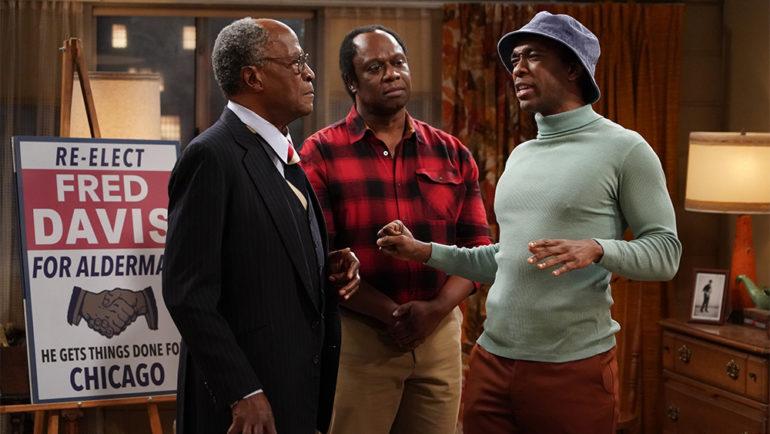‘Live in Front of a Studio Audience’: TV Review
By Daniel D’Addario
LOS ANGELES (Variety.com) – “Live in Front of a Studio Audience,” ABC’s live staging of episodes of “Good Times” and “All in the Family” fell victim, briefly, to a more substantial bit of 1970s cosplay.
Which is to say that the impeachment of a Republican president — a political event with inherent connections to the Watergate scandal that led to Richard Nixon’s 1974 resignation, albeit done with bigger contemporary stars, and to less apparent effect — briefly cut into the staging of the 1974-79 sitcom “.” The new “Good Times,” similarly done with bigger contemporary stars, similarly achieved less apparent immediate effect.
Viewers missed several minutes of a story that positioned the Evans family (led, in 2019, by Andre Braugher and Viola Davis) against a rapacious local politician when the broadcast cut in to announce, first, that President Trump had been impeached on the first charge against him, of abuse of power. Later, the end of that episode seemed briefly curtailed by the announcement of Trump’s impeachment on the second charge, of obstruction of Congress.
That was too bad, if only because the “Good Times” episode seemed vaguely resonant to our moment in a way that the “” episode chosen did not. (Blown lines, especially on the part of Braugher, might be forgiven in service of a larger point, had the story been told to completion.) If there was an episode for current events to interrupt, it felt almost poetically ironic that it had to be the episode about a black family carrying out small acts of resistance, as opposed to a Christmas episode of “All in the Family” that tended to feature, in the show’s own manner, liberal adult children endlessly flattering their Nixonian papa, until they stop.
Breaking news breaking into the stuff we view for fun is nothing new; to this day, I remain convinced that ABC mishandled, somehow and in a way I couldn’t name, the 2003 Oscars, in which acceptance speeches were interpolated with solemn and grave updates on the initial invasion of Iraq. It colored the evening and lent an even-guiltier-than-usual energy to the pleasure of the proceedings. Rationality and awareness of production realities insists that there’s no way that Oscars or this broadcast could have been moved to another night, given the talent involved, and yet the end result seems the worst sort of compromise: A program shouting at you to have fun just as soon as it can jerk your head away from realities on the ground, or telling you to be miserable just as soon as you can stop having fun. (Little wonder those Oscars were notably poorly rated by the standards of their era; one wonders how many stayed tuned to “” after the first break-in by the news division.)
But the Oscars at least provide pleasure, in moments; “Live in Front of a Studio Audience” insisted upon political gravity, somewhat at random and divorced from the concerns we’re currently feeling. It’s unfair to insist upon relevance above all, but an episode about a Vietnam draft-dodger joining Archie Bunker resonates, at least to this ear, only historically. It is written so specifically about this moment as to exclude even the present-day celebrities involved in staging its recreation. Why not just rebroadcast the original episode, and see what connections could be found?
Above all, ABC seems to want to merge contemporaneity — the fact that it still can book Marisa Tomei and Woody Harrelson — with its idea of itself as a place that can accomplish what old-style broadcast TV once did. It was borne out, more than any aspect of the broadcast, by the retro-style house ads between segments of Viola Davis as Florida Evans or Tomei as Edith Bunker. Those ads moved from credible (“‘The Goldbergs’ is like a ’70s sitcom!”) to mildly deranged (“‘A Million Little Things’ is like a ’70s sitcom!”). More effort, in a way, seemed placed into making ABC’s current shows seem like library classics than in making either of ABC’s library shows presented in a live context thrive outside its own historical setting; it was left to the viewer to figure out for themself why “All in the Family” and “Good Times” were important. Part of that may be a problem of the TV canon: Shows like “All in the Family” or “Good Times” live on in the public imagination vastly less than do films of their era. (Kids still watch “The Godfather”; many seasons of Archie Bunker represent a heavier lift.) And part of that is a problem of presentation, too. Plopping contemporary stars into old scripts and trusting it’ll move us feels like a cop-out. As the broadcast itself bore out, people in 2019 have a lot else on their minds.

